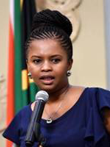By Khusela Diko
 Although few things are certain during these unprecedented times, there is a relative consensus among experts about two things: first, that the national lockdown was a success, and second, that it needs to end.
Although few things are certain during these unprecedented times, there is a relative consensus among experts about two things: first, that the national lockdown was a success, and second, that it needs to end.
When President Ramaphosa declared a national state of disaster on 15 March 2020, he did so on the advice of South Africa’s leading public health experts, including our world-class scientists at the National Institute for Communicable Diseases (NICD).
Two weeks later, when he announced a national lockdown to halt the spread of the coronavirus and save lives, he did so again on the advice of our scientists.
Experts advised government at the time that a lockdown was the only effective way to prevent an exponential and uncontrolled increase in the infection rate. The coronavirus has a binary effect: if it is controlled, its outcomes can be fairly benign. If it spreads rapidly and overwhelms the health system, the consequences are devastating.
It is like the difference between the controlled burn set intentionally to maintain a forest, and a wildfire.
From the outset, government’s primary objective has been to avoid a wildfire at all costs. We have seen the dire effects of a surge in infections in countries such as Italy, Spain, Brazil, the United States, and the United Kingdom.
South Africans do not want to see bodies pile up in mass graves, as hospitals are overwhelmed and there are not enough ventilators for all those who need care.
Epidemiologists have warned for decades of the destructive potential of a global pandemic. Human beings have no immunity against a new virus. Airborne diseases are the most dangerous, as they spread rapidly through the population.
Until a vaccine is developed, we have few defences against this virus. It is highly contagious, and difficult to suppress in a population as large as ours. Although its case fatality rate is low, because we have no natural immunity, hundreds of thousands would die if it were left to spread through even half of the population.
This is why an early and effective lockdown is the best weapon we have. In our case, the lockdown gave us valuable time to build the capacity of the health system, prepare field hospitals and quarantine sites, procure equipment, and train our healthcare workers.
South Africa has managed better than almost any other country in the world to “flatten the curve” of infections while “raising the line” of health system capacity.
But we all agree that the lockdown is a blunt instrument, and it cannot go on indefinitely. Despite the unprecedented scale of emergency relief measures implemented by government – including almost 2.5 million workers whose jobs have been saved by the UIF to date – people have to go back to work, and businesses have to begin to earn revenue.
Government funding can plug a temporary gap, but it cannot replace economic activity.
The public health experts advising government have therefore suggested that the lockdown has served its purpose. It is time for South Africa to ease restrictions, allowing most economic activity to resume in most parts of the country.
This is what President Ramaphosa announced in his address on Thursday night. Not an extension of the lockdown, as some have called it but a genuine easing of restrictions in a responsible manner.
Reopening the economy, as many countries have already discovered, comes with serious risks of a “second wave” or resurgence in infections.
Some have called on government to open all of the economy immediately, and simply rely on employers to protect their workers. Unfortunately, the task is not so simple.
Many of the worst cluster outbreaks elsewhere in the world have begun in factories, retail stores and workplaces. If adequate protocols are not in place, or if too many workers return all at once, the risk of these outbreaks increases manifold.
This is a delicate balancing act, and it requires care and precision. That’s one reason why debate is healthy and necessary – in a constitutional democracy, government benefits from hearing all views and selecting the best path.
Constructive contributions to government’s response are one thing. Trying to score political points in the midst of a national disaster, and pressing government to take rash decisions, is another.
The lockdown has required sacrifices from all South Africans, but they have been worthwhile. The alternative was too awful to contemplate.
The irony is that the more effective government’s response is at containing the epidemic, the greater the criticism will be. Many people will conclude that the stringent measures government has taken were unnecessary, until they see bodies piling up in morgues.
It is too easy to criticise government policies when their aim is to achieve the best possible outcome in a crisis situation. The most effective government responses in the world will mitigate the worst effects of this pandemic, but they won’t avoid them entirely.
That’s why this crisis requires solidarity, unity and commitment to a common purpose. We all have to do the best we can in the face of a massive and unexpected external shock.
The best government can do is to listen closely to its people, and to the experts. To remain responsive, agile and compassionate at all times. That is what the President has committed to do, and will continue to do as we work to save lives and protect the livelihoods of all South Africans.
Khusela Diko is spokesperson for President Cyril Ramaphosa.




